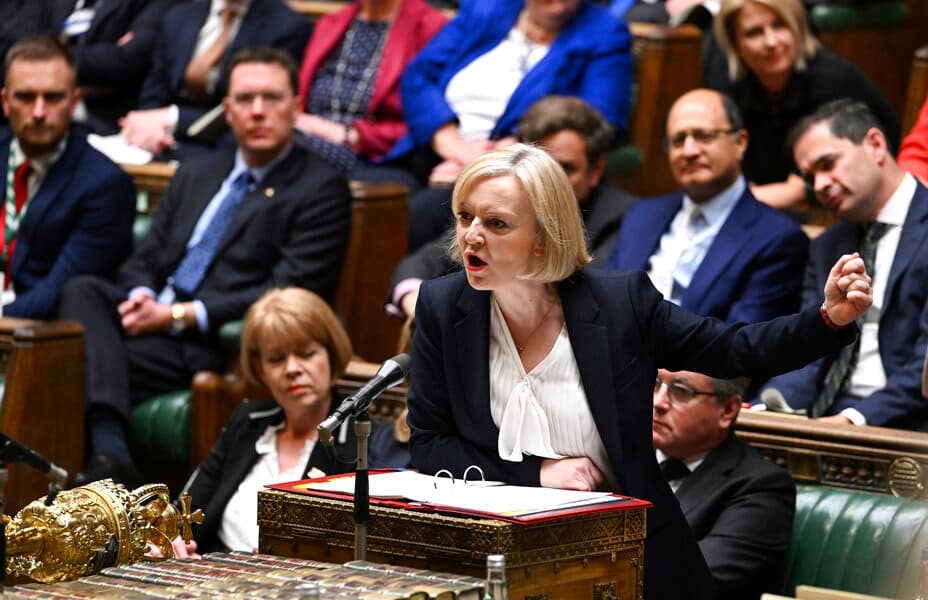Truss Quits Amid Tory Rebellion, Financial Turmoil
Just a day earlier she had vowed to stay in power, saying she was ‘a fighter and not a quitter.’ The opposition Labor party is calling for a general election.

LONDON — Prime Minister Truss has resigned — bowing to the inevitable after a tumultuous six-week term in which her policies triggered turmoil in financial markets and a rebellion in her party obliterated her authority.
She said “I cannot deliver the mandate on which I was elected.”
Just a day earlier Ms. Truss had vowed to stay in power, saying she was “a fighter and not a quitter.”
Yet Ms. Truss left Thursday after she was forced to abandon many of her economic policies and lost control of Conservative Party discipline.
Her departure leaves a divided party seeking a leader who can unify its warring factions.
A growing number of lawmakers had called for Ms. Truss to resign after weeks of turmoil sparked by her pro-growth, supply-side economic plan.
The plan, unveiled by the government last month, triggered financial turmoil and a political crisis that has seen the replacement of Ms. Truss’ Treasury chief, multiple policy U-turns and a breakdown of discipline in the governing Conservative Party.
Earlier, a Conservative lawmaker, Simon Hoare, said the government was in disarray.
“Nobody has a route plan. It’s all sort of hand-to-hand fighting on a day-to-day basis,” he told the BBC on Thursday. He said Ms. Truss had “about 12 hours” to turn the situation around.
Ms. Truss had held a hastily arranged meeting in her 10 Downing Street office with a senior Conservative lawmaker who oversees leadership challenges, Graham Brady. Mr. Brady was tasked with assessing whether the prime minister still has the support of Tory members of Parliament — and it seemed she did not.
A growing number of Conservative members of Parliament had called Thursday for her to step down and end the chaos.
“It’s time for the prime minister to go,” lawmaker Miriam Cates said. Another, Steve Double, said of Ms. Truss: “She isn’t up to the job, sadly.” Legislator Ruth Edwards said “it is not responsible for the party to allow her to remain in power.”
Lawmakers’ anger grew after a Wednesday evening vote over fracking for shale gas — a practice that Truss wants to resume despite opposition from many Conservatives — produced chaotic scenes in Parliament.
With Conservatives holding a large parliamentary majority, an opposition call for a fracking ban was easily defeated. But there were displays of anger in the House of Commons, with party whips accused of using heavy-handed tactics to gain votes.
A lawmaker from the opposition Labour Party, Chris Bryant, said he “saw members being physically manhandled … and being bullied.” Conservative officials denied there was manhandling.
Rumors swirled that the Conservative Chief Whip, Wendy Morton, who is responsible for party discipline, and her deputy had resigned. Hours later, Ms. Truss’ office said both remained in their jobs.
Newspapers that usually support the Conservatives were vitriolic. An editorial in the Daily Mail was headlined: “The wheels have come off the Tory clown car.”
The International Trade secretary, Anne-Marie Trevelyan, sent onto the airwaves Thursday morning to defend the government, insisted the administration was providing “stability.” But she was unable to guarantee Ms. Truss would lead the party into the next election.
“At the moment, I think that’s the case,” she said.
With opinion polls giving the Labor Party a large and growing lead, many Conservatives now contend their only hope of avoiding electoral oblivion is to replace Ms. Truss. But they were divided about how to get rid of her, and over who should replace her.
The party is keen to avoid another divisive leadership contest like the race a few months ago that saw Ms. Truss defeat the ex-Treasury chief, Rishi Sunak. Among potential replacements — if only Conservative lawmakers can agree — are Mr. Sunak, the House of Commons leader, Penny Mordaunt, and the newly appointed Treasury chief, Jeremy Hunt.
A national election doesn’t have to be held until 2024.
Speaking to lawmakers for the first time since her economic policy reversal, Ms. Truss apologized Wednesday and admitted she had made mistakes during her six weeks in office, but insisted that by changing course she had “taken responsibility and made the right decisions in the interest of the country’s economic stability.”
Opposition lawmakers shouted “Resign!” as she spoke in the House of Commons.
The Labor Party leader, Sir Keir Starmer, accused the Conservatives of lacking “the basic patriotic duty to keep the British people out of their own pathetic squabbles.”
He said that amid a worsening a cost-of-living crisis, “Britain cannot afford the chaos of the Conservatives anymore. We need a general election now.”
